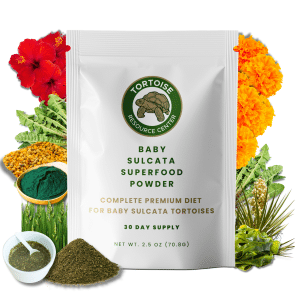Tortoises have exploded in popularity over the last decade or two.
Years ago, hobbyists would have considered themselves lucky to see a single wild-caught tortoise for sale at the local pet store. But these days, modern reptile lovers have access to thousands of captive-bred tortoises, in their choice of a dozen or more species.
But what about the question of whether they make good pets? It’s something that comes up in conversation for me on a regular basis, and one that requires a whole lot of thought by way of a response.
Tortoises as Pets: The Basics
While each species has different needs and poses different challenges, tortoises have a lot of things in common, and there are many broad statements that apply to most members of the group.
Typical Behaviors
Most tortoises are diurnal animals, who’re active during the daytime. This is a great plus for keepers to enjoy, as it makes their pets easy to observe.
However, tortoises do spend a lot of time hiding, just like many other popular reptiles and amphibians. A great way to encourage your tortoise to become active at a chosen time of day is to schedule your pet’s feeding and bathing times in a manner that suits your schedule.
Lifespan
When provided with good husbandry, a proper diet, and suitable veterinary care, tortoises will generally live very long lives. Most captive tortoises can likely reach at least 50 years of age, and some are capable of achieving triple-digit lifespans. In fact, the oldest tortoise in the world is currently 191 years old!
Bear in mind that there’s not a lot of data available about the lifespans of all tortoise species, as many have only been maintained in captive conditions for a few decades.
Temperaments
Most tortoises can be described as calm, if not downright docile.
This is because the thick shells of tortoises have evolved to be their primary defense mechanisms (along with behavioral defenses, such as remaining hidden for long portions of the day). Accordingly, when faced with a perceived threat, tortoises just withdraw into their shell and wait for the danger to pass.
But different species also exhibit slightly different behaviors and temperaments.
For example, the Russian tortoise (Testudo horsfieldii) and red footed tortoises (Chelonoidis carbonaria) are often quite bold and outgoing. Many will follow their keeper around their enclosure and “beg” for food. By contrast, leopard tortoises (Stigmochelys pardalis) are relatively shy – especially when obtained as wild-caught adults.
General Care Requirements
If you’re a beginner and looking to understand more about the best pet tortoise, you should know that each species requires a unique care regimen, but most tortoises will need the following:
- A suitable enclosure: Tortoises require enclosures, which oftentimes need to be large and may need to be built from scratch. Generally, it is best to house tortoises outside if you live in a suitable climate.
- The proper climate: Tortoises maintained indoors will need heating and lighting fixtures to provide proper temperatures and the kind of full-spectrum light their particular species require to stay healthy.
- A safe substrate: A substrate helps provide traction for your pet, and it also allows for natural behaviors, such as tunneling. The substrate will also need to be cleaned regularly and replaced periodically.
- Appropriate enclosure furniture: Tortoises need places to hide, and many also appreciate visual barriers inside the habitat. These items will need to be cleaned regularly and replaced when they become damaged.
- A healthy diet: Most tortoises require a predominantly vegetarian diet, although some Forest species do also consume a small amount of animal-based protein. Generally, you’ll need to feed young tortoises daily, while adults usually thrive best when fed five to six times per week.
- Regular veterinary care: Although tortoises don’t require vaccinations like dogs and cats do, they will still need to visit the veterinarian anytime they suffer illness or injury. They should also see a veterinarian at least once per year, even when healthy.
Pros, Cons, and Considerations
As with all pets, tortoises provide some benefits, but they also provide some drawbacks. It is only by carefully considering these pros and cons that you can decide if a tortoise will make a good pet for you.
Are You Starving Your Tortoise?
Save 10% on premium tortoise food and supplements from Tortoise Resource Center on Amazon now using code BUYNOWGET10

Sulcata Vitamin & Mineral Topper Supplement
30-Day Supply | 2 oz (56 g)
$24.99

Baby Sulcata Tortoise Superfood Powder
30-Day Supply | 2.5 oz (70.8 g) Bag
$24.99
Benefits
Tortoises undoubtedly have a lot of things going for them, and they can make great pets. A few of the most notable benefits they provide include:
- Tortoises are “hypoallergenic.” Because they don’t produce dander or shed fur the way dogs, cats, and similar pets do, tortoises don’t usually cause allergy problems for their keepers.
- Tortoises live very long lives. While this can present its own challenges (many tortoise keepers must include their pets in their wills), the long lifespan of tortoises can make them more appealing than short-lived species, such as chameleons, invertebrates, and some small mammals.
- Tortoises don’t smell as bad as some other pets. While a dirty tortoise habitat can be quite odorous, well-kept tortoises living in clean enclosures rarely smell as much as pet birds or small mammals.
- Tortoises rarely bite. While anything with a mouth can bite, tortoises rarely bite defensively like some snakes, lizards, or mammals do. However, some opportunistic eaters, who’ll “taste” just about anything – including the fingers that feed them!
- Tortoises don’t require training. Unlike dogs and – to some extent – cats, tortoises don’t require any training. They’ll spend most of their lives living in an enclosure, so you needn’t teach them to behave properly.
Challenges
While tortoises are more enjoyable to keep than many other pets in some respects, they do present some significant challenges to their keepers. A few of the most important include:
- Tortoises require lots of space. While the smallest tortoise species only require habitats that provide about 4 square feet of space per individual, medium-sized species require 25- to 100-square-foot enclosures. And the largest species require enclosures that are the size of your entire backyard.
- You’ll likely need to construct a custom habitat. While there are commercially manufactured tortoise enclosures that are large enough for some of the smallest species, most tortoises will quickly outgrow even the largest versions and require a custom-built alternative.
- Tortoises have elaborate heating and lighting needs. The lighting and heating equipment needed to maintain tortoises is expensive and requires a lot of work to set up and monitor.
- It can be tricky to find a veterinarian for tortoises. Most veterinarians focus on cats, dogs, and similar pets, so you may have trouble finding one who’ll help keep your tortoise in good health.
- Tortoises can be challenging to feed. Balancing the nutritional needs of tortoise species often requires significant research, and some of the best foods for some species are not commercially available (such as grasses for grazing tortoise species).
Cost of Ownership
While some tortoises are available for relatively affordable prices, the actual animal only represents a small portion of your startup costs.
Generally speaking, you’ll need to budget for the following:
- Tortoise: The most affordable tortoises cost about $50 or so, but the most expensive species have five-digit price tags.
- Enclosure: You may be able to set up a small enclosure for a hatchling for $50; large adult accommodations will cost hundreds or thousands of dollars.
- Lighting and heating devices: This will generally cost between $100 and $500, depending on the size of the enclosure.
- Substrate: You may only need $10 worth of substrate for a small habitat; large habitats may require hundreds of dollars of substrate.
- Enclosure furniture: Some types of furniture (such as cork bark) are expensive, but your enclosure furniture will generally cost between $20 and $200, depending on the size of the enclosure.
- Food and water dishes: These should only cost about $10 to $20.
There are also on-going costs associated with tortoise ownership you’ll also need to account for. These include things like food, replacement lights, and fresh substrate. You’ll also need to set aside funds to pay for veterinary care.
Yearly costs for veterinary care are hard to predict. To be properly prepared, you should have a veterinary fund of at least $1,000 established, but even this may not be enough to cover the costs of serious care.
Compatibility As a Family Pet
As long as the people in your family are comfortable with tortoises, they can make very good family pets. They will, however, need to be protected from larger pets, such as dogs or cats, who may attack the tortoises.
It is also important to note that tortoises can carry pathogens, such as Salmonella bacteria. These bacteria generally don’t pose a serious health risk to healthy adults, as long as proper hygiene practices and hand-washing are observed.
However, such bacteria can prove to be serious – even life-threatening – to young children, elderly individuals, and those who are immuno-compromised. Accordingly, they’re not recommended in homes with people that fall into one of these categories.
Legal and Ethical Considerations
There are myriad laws regarding the ownership of turtles and tortoises, which vary from one location to the next.
Some tortoises, such as Galapagos tortoises (Chelonoidis niger), enjoy federal or international protection, making them illegal for most private individuals to own. And all tortoises measuring less than 4 inches in length are illegal to sell in the United States, unless they’re sold for bona fide scientific or educational purposes.
Other species are protected at the state or local level. For example, gopher tortoises (Gopherus polyphemus) are illegal to keep in some of the states within their natural range. Some species, such as Egyptian tortoises (Testudo kleinmanni), are legal to keep in a given state, but they can’t be carried across state borders.
Legalities aside, it is always important to purchase your tortoise from ethical sources. This means sticking to captive-bred individuals whenever possible, and avoiding wild-caught individuals from species that are threatened or endangered.
My Final Thoughts
Tortoises certainly aren’t great pets for every person or living situation. They require a lot of care and effort (not to mention money) to keep happy and healthy.
But for those people who are willing to dedicate the time and resources necessary for their care, tortoises can make very rewarding pets. Just be sure to thoroughly research the needs of the species you intend to keep and be honest with yourself regarding the steps you’ll need to take to properly maintain your pet.
Citations and References
- Smithsonian Magazine – The World’s Oldest Living Land Animal, a Tortoise Named Jonathan, Turns 191
- San Diego Zoo Wildlife Alliance Library — Galapagos Giant Tortoises (Chelonoidis spp.) Fact Sheet: Population & Conservation Status
- PLoS One — Online sale of small turtles circumvents public health regulations in the United States


